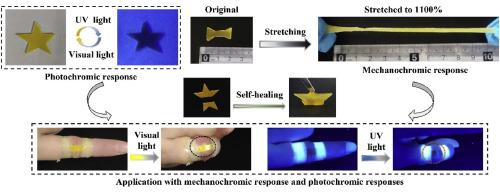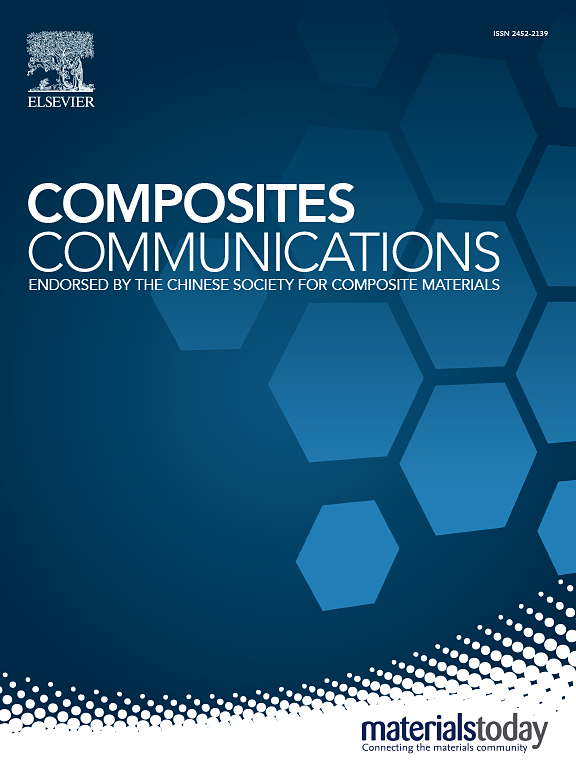Dual photochromic/mechanochromic responses of self-healing cellulose-based film for anti-counterfeiting and damage warning
IF 7.7
2区 材料科学
Q1 MATERIALS SCIENCE, COMPOSITES
引用次数: 0
Abstract
It is challenging to develop novel dual stimuli-responsive materials with synergetic color-switching responses and outstanding self-healing properties. Herein, a novel cellulose-based photochromic and mechanochromic film was prepared by a facile synthesis process. The photochromic and mechanochromic responses not only exhibited various color transitions in response to different stimuli but also synergized with each other. In particular, the color of the mechanochromic response changed from purpleness to whiteness under ultraviolet light, which differs from the color transition from yellowness to whiteness under visible light. The uninterrupted and synergistic responses were attractive for applications in anti-counterfeiting and damage warning. Moreover, the dual stimuli-responsive material balanced the comprehensive properties. The optimized sample has high stretchability (1100 %), excellent cyclic stretch-relax performance (higher than 30 times at strain of 400 %), superior self-healing properties (2 h of healing at room temperature), and good shape memory behavior (shape recovery ratio of 97.5 %). Above all, the dual stimuli-responsive material combined photochromic and mechanochromic responses with high stretchability, excellent repeatability, outstanding self-healing property, and good shape memory behavior, demonstrating the great potential for applications in anti-counterfeiting, damage warning, and flexible wearable devices.

用于防伪和损伤预警的自修复纤维素基薄膜的双光致变色/机械致变色反应
开发具有协同颜色转换反应和优异自愈性能的新型双刺激反应材料是一项具有挑战性的工作。本文采用简单的合成方法制备了一种新型的纤维素基光致变色和机械致变色薄膜。光致变色和机械致变色不仅在不同的刺激下表现出不同的颜色过渡,而且还表现出协同效应。特别是,机械变色响应的颜色在紫外光下由紫色变为白色,这与可见光下由黄色变为白色的颜色转变不同。不间断和协同响应在防伪和损害预警方面具有重要的应用前景。此外,双刺激反应材料平衡了综合性能。优化后的样品具有较高的拉伸性能(1100%),优异的循环拉伸-松弛性能(400%应变下超过30次),优异的自修复性能(室温下2 h的愈合)和良好的形状记忆性能(形状恢复率为97.5%)。最重要的是,双刺激响应材料结合了光致变色和机械致变色响应,具有高拉伸性、优异的可重复性、出色的自修复性能和良好的形状记忆行为,在防伪、损伤预警和柔性可穿戴设备等方面具有巨大的应用潜力。
本文章由计算机程序翻译,如有差异,请以英文原文为准。
求助全文
约1分钟内获得全文
求助全文
来源期刊

Composites Communications
Materials Science-Ceramics and Composites
CiteScore
12.10
自引率
10.00%
发文量
340
审稿时长
36 days
期刊介绍:
Composites Communications (Compos. Commun.) is a peer-reviewed journal publishing short communications and letters on the latest advances in composites science and technology. With a rapid review and publication process, its goal is to disseminate new knowledge promptly within the composites community. The journal welcomes manuscripts presenting creative concepts and new findings in design, state-of-the-art approaches in processing, synthesis, characterization, and mechanics modeling. In addition to traditional fiber-/particulate-reinforced engineering composites, it encourages submissions on composites with exceptional physical, mechanical, and fracture properties, as well as those with unique functions and significant application potential. This includes biomimetic and bio-inspired composites for biomedical applications, functional nano-composites for thermal management and energy applications, and composites designed for extreme service environments.
 求助内容:
求助内容: 应助结果提醒方式:
应助结果提醒方式:


